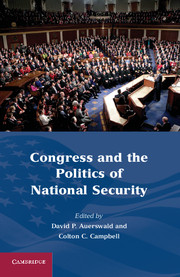9 - Arms Control
from Part Three - Policy Challenges: Contours of Debate
Published online by Cambridge University Press: 05 June 2012
Summary
There is a strong history of bipartisanship when it comes to the evaluation of international treaties, particularly arms control treaties.
– President Barack Obama, April 8, 2010When Majority Leader Harry Reid asked me if I thought the treaty could be considered in the lame duck session, I replied that I did not think so given the combination of other work the Congress must do and the complex and unresolved issues related to START and modernization.
– Senator Jon Kyl (R-KY), November 16, 2010This book began with the question of whether the first branch of government is adequately organized to deal with national security issues in an integrated and coordinated manner. Specifically, Chapter 1 asked whether Congress is capable of effectively influencing security policy given heightened partisanship, message politics, party-committee relationships, and bicameralism. This chapter focuses on the Senate’s role in making international treaties to help answer some of those questions. I argue that the Senate has regularly and increasingly exercised authority over national security policy using the treaty advice and consent process. The recent passage of the New START treaty was just the latest example of growing Senate assertiveness when considering treaties, despite, or perhaps because of, heightened partisanship, message politics, and party-committee relationships. Rather than being a break from the past, consideration of New START was indicative of a long-term trend.
As introduced in Chapter 1, two considerations help determine the extent of congressional influence over national security policy: whether Congress possesses the will and the capability to affect policy. On the latter point, this chapter will argue that the constitutional requirement that the Senate provide its advice and consent before a treaty can enter into force allows the Senate the means to influence national security policy. On the former point, a number of domestic political factors – some dependent on individual lawmakers’ perceptions of international events and others dependent on raw political calculation – make it more and more likely that individual senators will choose to exert their will using the treaty advice and consent process.
- Type
- Chapter
- Information
- Congress and the Politics of National Security , pp. 189 - 212Publisher: Cambridge University PressPrint publication year: 2011
- 1
- Cited by



